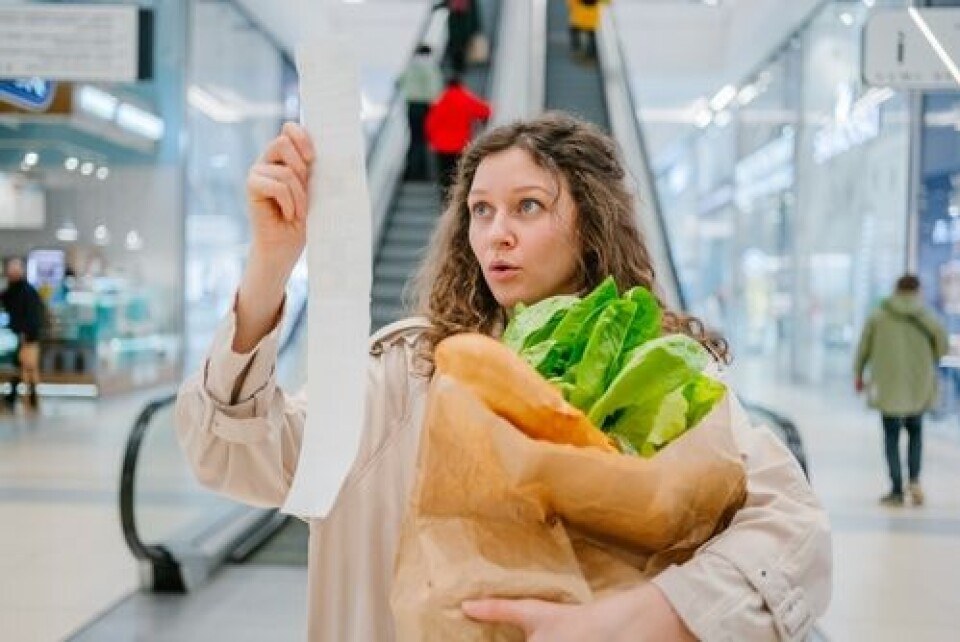-
Photo: what is the strange ‘hair ice’ phenomenon seen in France recently?
Extremely rare formation is occurring in eastern woodlands
-
Macron confirms what he wants to say to Trump when he visits US next week
Ukraine, EU and US relations and geopolitical situation are unsurprisingly key topics
-
More trains and routes linking UK to France (and other European countries) expected under new agreement
British rail regulators hope for new international lines on UK-France high-speed route
Why food prices are at risk of rising again in France from March
Supermarket boss says most producers are asking for new increases of at least 10% as annual negotiations continue

Food prices in France could rise again in March as ongoing negotiations come to an end between suppliers and supermarkets.
Store prices were already 13.2% up year on year in January, the state statistics bureau Insee notes, and inflation is continuing to have a significant effect due to the still-increasing cost of raw materials, packaging, transport, and energy.
Now, some supermarkets have said that March could be a ‘red’ month as discussions with suppliers are set to end on February 28. These began on December 1, 2022, with the agenda focusing on sales conditions of products as well as prices.
Christiane Lambert, president of farming producer union la Fédération nationale des syndicats d'exploitants agricoles (FNSEA), told FranceInfo that prices remain high due to “the explosion” in costs for farmers, which were not fully absorbed in 2022.
Head of the E.Leclerc supermarket giant, Michel-Edouard Leclerc, wrote on his blog that “few producers are asking for anything less than 10% [in rising costs] and most are asking for 10-30%”.
‘Red March could last until June’
Lionel Maugain, journalist for Le Parisien, wrote that the highest rises could be for products from major brands, given that most supermarket own brand items “already rose in price last year”.
He added that the so-called ‘red March’ could last “until June…because big supermarkets will have to first get rid of stock at the old prices. Technically, March 1 will not actually be the day that everything changes”.
Price laws
Rising prices have also been attributed to the forthcoming ‘loi Descrozaille’ – named after the MP Frédéric Descrozaille (Centrist Renaissance party) who proposed it – which will limit promotional prices on hygiene and cleaning products to 34% in a bid to rebalance prices with returns given to manufacturers.
Read also: Senators back ending 2-for-1 deal on toiletries in French supermarkets
This is a similar rule to the ‘loi Egalim’, which imposes the same cap on food items to ensure that farmers and producers never make a loss on items sold.
The ‘loi Descrozaille’ also seeks to set a minimum price for products in the case of breakdown in communications between suppliers and supermarkets, which could happen at the end of February. Under the current rules, in case of negotiation breakdown, suppliers are required to continue delivering items under the same conditions as the previous year for several months.
However, supermarkets say the new law is unacceptable. Mr Leclerc wrote: “No commercial business will be able to reject price rises in the future”, except at the risk of stoppage of deliveries.
Despite being passed in the Senate, the law has been subject to several amendments in a bid to limit the effect on rising consumer prices. It states that even in case of negotiation breakdown, prices must take into account “the economic market situation”.
Stores had also wanted to suspend the rules that require supermarkets to sell products at a profit of at least 10%, saying that this measure has cost consumers €600million. However, this was later rejected in favour of maintaining adequate returns for farmers.
‘Anti-inflation’ basket
The debates come amid the government’s proposal to require supermarkets to offer an ‘anti-inflation’ basket of 50 everyday goods, at stable and low prices, for the months of March to June.
The basket would contain five fruits and vegetables, of which two would be organic. It would also include two starches, red or white meat of which at least one labelled as high-welfare and fish as well as dental products.
It would not include alcohol, sweets or any premium brands.
The idea, which already exists in some form in other countries, is set to be trialled in some areas in March.
Read more: What is ‘basket of low-cost basic goods’ plan for French supermarkets?
Read more: More details revealed on plan for 50 low-cost shopping items in France
However, it has been criticised by major consumer association UFC-Choisir, which condemned it as a “mechanism”. Olivier Andrault, UFC-Que Choisir food and drink head, said to AFP: “How can 50 products adequately respond to the diversity of needs of consumers? Supermarkets sell several hundred thousand items.”
Some supermarkets have voluntarily launched an ‘anti-inflation’ basket, and offered a selection of everyday products at prices that they claim they will keep as low as possible.
It comes as Insee predicts that food inflation will continue well beyond March. In a note published on February 7, it said: “Food will remain ahead as the top contributor to inflation, with a sliding scale year-on-year that will stay at around 13%...towards the horizon of mid-2023.”
Related articles
The cheapest supermarket in France revealed as others push deals
Inflation: another French supermarket freezes price of 300 items






















